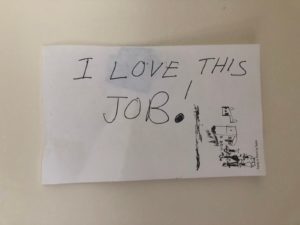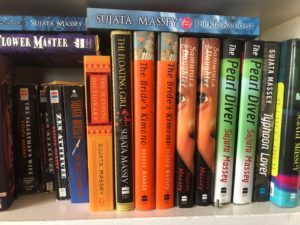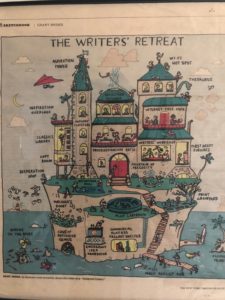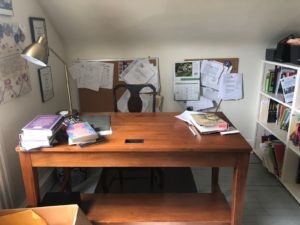A Writer’s Lament, Revised
This post originally appeared on Murder Is Everywhere.
A ragged, handwritten sign has been taped to my study wall for about a year.
I love this job!

A quarter-century ago, I was working full-time in university public relations and desperately longed to be a fiction writer. It seemed like an impossible dream, to stay home all day and use as much of it as I wanted for fiction. I thought I’d use each day to the fullest and greet my husband every evening with a smile and a reports of many pages written.
As the saying goes, be careful what you wish for.
I did leave that job, and began writing full-time at the age of thirty-two. And here I am, twenty-two years later, in the same job, but with the rose-colored glasses removed. With the sale of my first book came a lifestyle where I pretty much always have a deadline. It’s a lifestyle in which I can work every day but never be finished.

When I’m struggling with a chapter that’s going slowly, it’s hard to remember that I once longed to be in this place. In a writing day—for me, that’s three to four hours—I write 500 to 1000 words, when in the old days, I could do 3000-4000. Is it because my brain has fewer cells? Probably. Tat and the fact I’m writing historical mysteries, which make dashing off scenes and casual conversations more of a complex effort.
I am grateful to be published, and I love meeting readers and understand that my books are a fun escape for them. I wish I wasn’t looking for my own escapes within my writing day—activities like cooking, reading, napping, aqua aerobics, yoga, walking, lunch with a friend. Actually, all of these are healthy things to do. But they are methods of evading the hard business of thinking, which is Part A of writing. That’s the worst thing about writing—thinking up the sentences that I consider worthy of keeping rather than deleting. Sometimes, I feel as inexperienced and awkward as before I was even published.

A lot of writers say that they enjoy “having written” more than the writing itself. But I think that if I want to keep going at this ten or twenty more years, I’d better start enjoying the writing more. It would mean closing my laptop and moving on to dinner and evening activities in an upbeat mood,rather than a frustrated one.
We want the life that is just beyond us. Perhaps the idea of escape is something I can work with.
What if I reversed my thinking what my responsibilities are? Could I tell myself that I am working full-time again—but for needy dogs and people? What if the act of writing could be transformed into a kind of sanctuary? It would mean pretending that I didn’t have a deadline.
Okay, I’m game.
From this point forward, I am doing things that make it seem more like that. If I want to write snuggled up in bed for a couple of hours, I will allow myself to do that.

There is beautiful sunlight in my third floor study in the mornings, and that’s when I want to be there. Only then. On dark mornings, I can sit in my dining room and look straight across the hallway to the gas fireplace and two sweet dogs napping nearby.

Then there are times I am restless and know I will wind up in the kitchen making toast. In that case, I will pack my laptop, drive five minutes, and sit among the students in the Eisenhower library at Johns Hopkins University, where I was once a student.
Moving on from place to page. One strategy is to approach my work with curiosity. Surprises will come as I discover the story that was waiting all along.Why don’t I play with words rather than task myself with hammering them out? Can I try to enjoy my characters as if they’re in a film (or a really terrific BBC historical miniseries) playing before my eyes? Does the line of dialog I’ve written truly show anger, humor, or tenderness?
Being mindful about writing could make the process feel more like pleasure reading. Which is what it’s all about, isn’t it?



